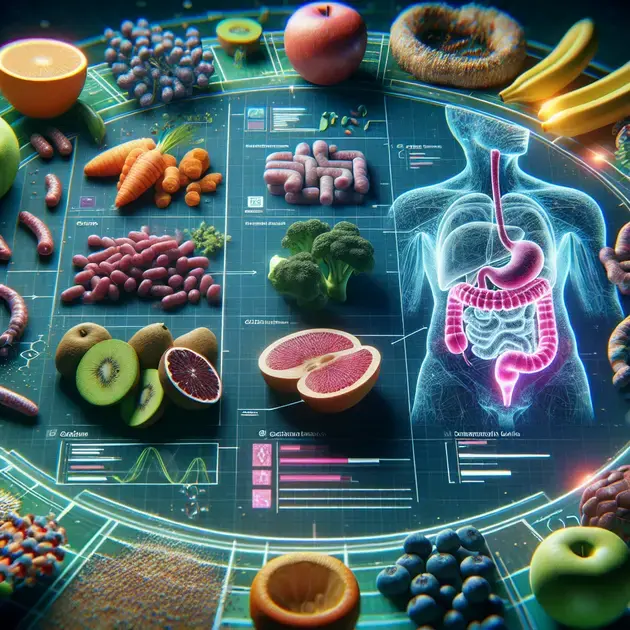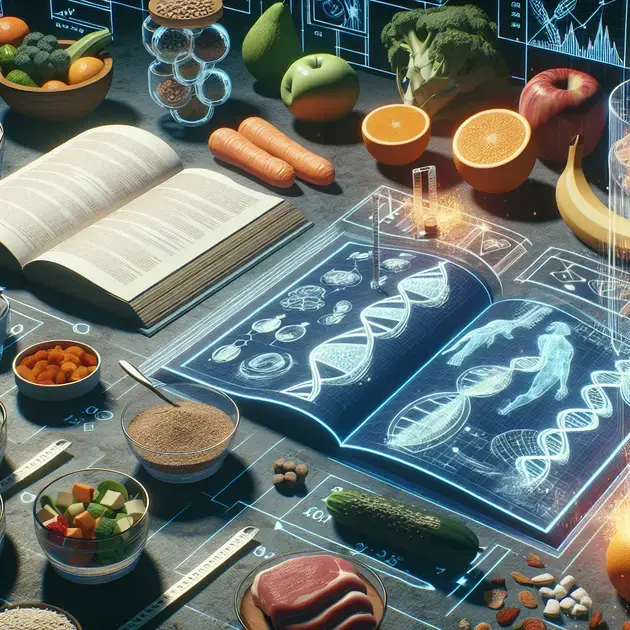Unlocking the link between food and weight loss can be a complex journey that requires understanding the intricate relationship between what we eat and our body’s response. In today’s world, where fad diets and conflicting information abound, it’s more important than ever to have a comprehensive guide that sifts through the noise to provide evidence-based insights.
Recent studies have shown that focusing on whole, nutrient-dense foods can lead to sustainable weight loss and overall improved health. By delving into the science behind how certain foods interact with our bodies, we can make empowered choices that support our well-being. This comprehensive guide aims to demystify the connection between food and weight loss, offering practical tips and strategies for achieving your health goals.

Understanding the Food-Weight Loss Relationship
Understanding the connection between food and weight loss is crucial for anyone looking to achieve their fitness goals. One practical way to do this is by tracking your daily food intake. Utilizing apps like MyFitnessPal or Lose It! can help you monitor the calories and nutrients in your meals. These apps provide databases with a wide range of foods, making it easier to track your eating habits accurately.
In addition to tracking food, it’s essential to educate yourself about portion sizes and the nutritional content of different foods. Websites like ChooseMyPlate.gov offer valuable resources on portion control and balanced nutrition. Learning to read nutrition labels and understanding ingredient lists can empower you to make healthier food choices.
Another aspect of the food-weight loss relationship is the importance of meal planning. Apps such as Mealime and Yummly can assist you in creating nutritious meal plans and grocery lists. By planning your meals in advance, you are less likely to make impulsive food choices that could derail your weight loss efforts.
Furthermore, seeking guidance from a nutritionist or a registered dietitian can provide personalized recommendations based on your specific dietary needs and weight loss goals. These professionals can help you develop a sustainable eating plan that supports your overall health and wellness.
By understanding how food impacts weight loss and utilizing tools and resources like tracking apps, educational websites, meal planning apps, and professional guidance, you can take proactive steps towards achieving your desired weight loss outcomes.
The Science Behind Nutrient-Dense Foods
Exploring the science behind nutrient-dense foods can enhance your understanding of their role in a healthy diet. Begin by familiarizing yourself with the concept of nutrient density, which refers to the number of nutrients per calorie in a particular food. Websites like Healthline and Harvard Health Publishing offer comprehensive articles explaining the importance of nutrient-dense foods.
When it comes to incorporating nutrient-dense foods into your diet, focusing on whole, unprocessed foods is key. Apps such as Whole Foods Market and Farmstand can help you discover local sources of fresh produce and other whole foods. By prioritizing fruits, vegetables, lean proteins, and whole grains, you can boost your nutrient intake and support overall health.
Another aspect of the science behind nutrient-dense foods is understanding micronutrients and their functions in the body. Websites like Nutrition.gov provide detailed information on essential vitamins and minerals, along with their sources in food. By diversifying your diet and including a variety of nutrient-rich foods, you can ensure that your body receives all the essential nutrients it needs.
Furthermore, learning about the impact of cooking methods on nutrient retention can help you preserve the nutritional value of your meals. Apps like SideChef and Cookpad offer healthy recipes and cooking tips to help you prepare nutrient-dense meals at home. By using techniques like steaming, grilling, or stir-frying, you can maximize the nutrient content of your dishes.
By delving into the science behind nutrient-dense foods, exploring sources of information, focusing on whole foods, understanding micronutrients, and optimizing cooking methods, you can elevate your dietary choices and support your overall well-being.
Practical Tips for Sustainable Weight Loss
Implementing practical tips for sustainable weight loss is essential for achieving long-term success. One effective strategy is to set realistic and achievable goals. Apps like Noom and Weight Watchers offer goal-setting features and progress tracking to help you stay motivated and on track with your weight loss journey.
Incorporating regular physical activity into your routine is another key aspect of sustainable weight loss. Websites like MyFitnessPal and Fitbit provide resources for tracking exercise and setting fitness goals. By finding activities you enjoy, such as walking, cycling, or yoga, you can make exercise a sustainable and enjoyable part of your lifestyle.
Evaluating your eating habits and identifying areas for improvement is crucial for sustainable weight loss. Apps like Rise Up and Nutritionix offer food diary features and personalized feedback from nutrition coaches. By becoming more mindful of your food choices and eating behaviors, you can make positive changes that support your weight loss goals.
Building a strong support system can also enhance your efforts towards sustainable weight loss. Joining online communities or engaging with friends and family who share similar health goals can provide encouragement and accountability. Apps like MyNetDiary and SparkPeople offer community support and motivational tools to keep you inspired along the way.
By incorporating practical tips such as goal setting, regular exercise, mindful eating, and building a support network, you can create a sustainable approach to weight loss that prioritizes long-term health and well-being.

Exploring the Impact of Gut Health on Weight Management
When it comes to weight management, the impact of gut health cannot be understated. Gut health plays a crucial role in the digestion and absorption of nutrients, as well as in regulating metabolism. Research has shown that an imbalance in gut bacteria can lead to weight gain and difficulty in losing weight. Therefore, paying attention to gut health is essential for overall health and successful weight management.
One of the key ways in which gut health affects weight management is through its influence on appetite and cravings. The gut produces hormones that signal to the brain when we are hungry or full. An imbalance in gut bacteria can disrupt these hormonal signals, leading to increased appetite and cravings for unhealthy, high-calorie foods. By promoting a healthy balance of gut bacteria through diet and lifestyle choices, it is possible to regulate appetite and cravings, making it easier to maintain a healthy weight.
Furthermore, gut health also plays a role in inflammation and insulin resistance, both of which are linked to weight gain and obesity. Chronic inflammation in the gut can interfere with the body’s ability to properly regulate blood sugar levels, leading to insulin resistance and weight gain. By supporting gut health through the consumption of anti-inflammatory foods and probiotics, it is possible to reduce inflammation and improve insulin sensitivity, thus supporting weight management efforts.
In summary, exploring the impact of gut health on weight management reveals the intricate connection between gut health and overall health. By nurturing a healthy gut environment through a balanced diet, probiotics, and lifestyle choices, it is possible to support weight management goals and promote overall well-being.
Effective Strategies for Breaking Through Weight Loss Plateaus
Breaking through weight loss plateaus can be a challenging and frustrating experience for many individuals on a weight loss journey. However, with the right strategies and mindset, it is possible to overcome these plateaus and continue making progress towards your weight loss goals. Here are some effective strategies for breaking through weight loss plateaus:
1. Reassess your calorie intake: As you lose weight, your body’s caloric needs may change. It is important to reassess your calorie intake and make adjustments accordingly to continue seeing progress.
2. Incorporate strength training: Building muscle through strength training can help boost your metabolism and support weight loss. Including regular strength training workouts in your routine can help break through plateaus and promote fat loss.
3. Mix up your workout routine: If you have hit a plateau, it may be time to change up your exercise routine. Try new workouts, switch up the intensity, or add new forms of exercise to challenge your body in different ways.
4. Focus on sleep and stress management: Poor sleep and high stress levels can hinder weight loss progress. Prioritize getting enough sleep and managing stress effectively to support your weight loss efforts.
5. Stay consistent and patient: Breaking through weight loss plateaus takes time and persistence. Stay consistent with your healthy habits, trust the process, and be patient with yourself as you work towards your goals.
Maximizing Metabolism with the Right Food Choices
Metabolism plays a key role in weight management, as it determines how efficiently your body burns calories. By making the right food choices, you can maximize your metabolism and support your weight loss efforts. Here are some tips for maximizing metabolism with the right food choices:
1. Include protein-rich foods: Protein requires more energy to digest compared to fats and carbohydrates, which can help boost your metabolism. Incorporate lean sources of protein such as chicken, fish, tofu, and legumes into your meals.
2. Eat metabolism-boosting foods: Certain foods, such as chili peppers, green tea, and whole grains, have been shown to increase metabolism and promote fat burning. Including these foods in your diet can help maximize your metabolic rate.
3. Stay hydrated: Drinking an adequate amount of water is essential for a healthy metabolism. Dehydration can slow down your metabolism, so be sure to stay hydrated throughout the day.
4. Don’t skip meals: Eating regular meals and snacks throughout the day can help keep your metabolism running smoothly. Skipping meals can slow down your metabolism and lead to overeating later on.
5. Incorporate strength training: In addition to food choices, strength training can also help boost metabolism by building lean muscle mass. Including strength training workouts in your routine can increase your metabolic rate even at rest.
Conclusion
Understanding the impact of gut health on weight management is crucial for achieving successful outcomes in your wellness journey. Gut health directly influences digestion, absorption of nutrients, and metabolic regulation, highlighting its pivotal role in maintaining a healthy weight. By prioritizing gut health through dietary and lifestyle choices, individuals can effectively manage appetite, cravings, and weight.
Moreover, the significance of gut health extends to inflammation and insulin resistance, both of which contribute to weight gain and obesity. Combatting chronic inflammation and enhancing insulin sensitivity through anti-inflammatory foods and probiotics can significantly support weight management efforts. The intricate connection between gut health and overall well-being emphasizes the need to cultivate a balanced gut environment for sustained health benefits.
When encountering weight loss plateaus, implementing strategic approaches can reignite progress and propel individuals towards their weight loss goals. Reassessing calorie intake, integrating strength training, diversifying workout routines, prioritizing sleep and stress management, and maintaining consistency are key strategies for overcoming plateaus, fostering resilience, and achieving long-term success in weight management.
Lastly, optimizing metabolism through appropriate food choices is paramount for enhancing calorie burn and supporting weight loss. Incorporating protein-rich foods, metabolism-boosting ingredients like chili peppers and green tea, staying hydrated, avoiding meal skips, and incorporating strength training are effective ways to maximize metabolic efficiency and promote fat loss. By aligning food choices with metabolic enhancement, individuals can amplify their weight management efforts and establish sustainable habits for long-lasting health benefits.